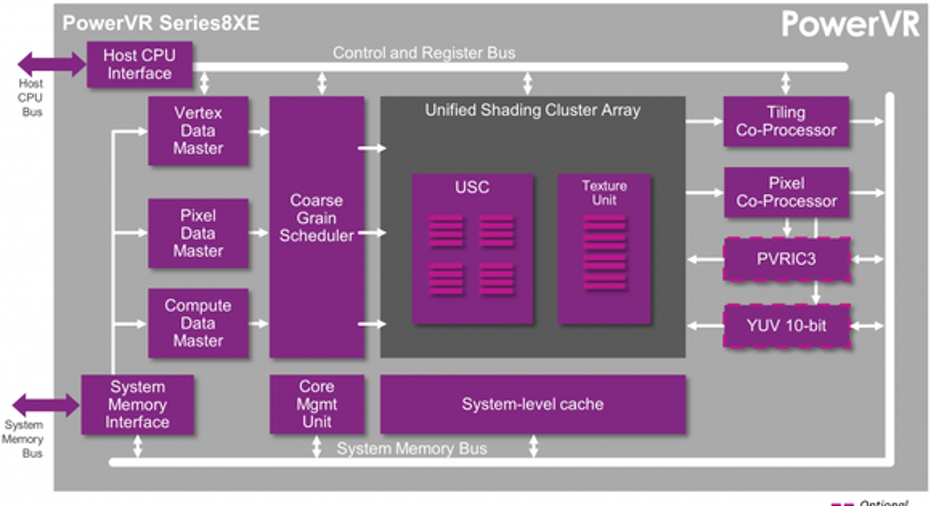Without Apple Inc., Imagination Technologies' PowerVR Has No Future

At this point, anybody with even a cursory interest in technology stocks has probably heard that Apple (NASDAQ: AAPL) recently informed graphics specialist Imagination Technologies (NASDAQOTH: IGNMF) that it would no longer need to use its graphics intellectual property in future mobile applications processors.
For those unfamiliar with Imagination, it is a small silicon intellectual property vendor that produces graphics and processor core that it licenses to companies that design and build their own chips. Imagination typically receives an up-front licensing fee for its intellectual property coupled with ongoing royalties for each chip containing its intellectual property sold.
Image source: Imagination Tech.
Imagination has historically depended heavily on Apple for the bulk of its revenue (just over 50% in fiscal year 2016). However, it's worth observing that this figure understates just how important Apple was to Imagination's PowerVR graphics business.
Digging into the numbers
In fiscal year 2016, Imagination reported that total revenue from what it defines as "continuing operations" came in at 120 million pounds (about $149 million).
Of that revenue, 17.1 million pounds (about $21 million) of it came from licensing revenue while 102.7 million pounds (about $128 million) came from royalty revenue.
Now, it's also worth noting that Imagination doesn't just sell graphics intellectual property. Several years back, Imagination bought MIPS Technologies in 2012 for $60 million. This acquisition added CPU intellectual properties to Imagination's portfolio, and it has been licensing MIPS processor technology since.
According to Imagination's annual report, the company enjoyed 6.44 million pounds ($8 million) in MIPS licensing revenue and 23.47 million pounds (approx. $30 million) in MIPS royalty revenue in its most recent fiscal year. PowerVR licensing was 10.16 million pounds (about $12.62 million) and royalty revenues were 77.7 million pounds (roughly $96.5 million).
In Imagination's disclosure vis-a-vis Apple, the former said that in fiscal year 2016, PowerVR licensing and royalties from Apple totaled 60.7 million pounds (about $76 million) in revenue.
Apple doesn't license Imagination's MIPS processor cores for its chips; its interest in Imagination's portfolio is solely in its PowerVR portfolio. What this means, then, is that Apple made up nearly 70% of Imagination's PowerVR graphics revenue in the company's prior fiscal year.
Without Apple, PowerVR has no future
If Imagination can't work out some sort of serious technology/patent licensing arrangement with Apple, then it is extremely unlikely that the former will be able to continue to fund the development of its PowerVR graphics technology.
Of course, there's the possibility that Imagination could find new, large customers for its technology, but that's not going to be easy. With Apple out of the picture, that's roughly 15% of the total addressable market in smartphones gone.
Furthermore, Qualcomm (NASDAQ: QCOM) is the largest smartphone applications processor vendor, capturing about 42% market share in 2015, per Strategy Analytics (2016 numbers should be a bit different, but you get the gist). Qualcomm builds its own graphics processors and is therefore not a potential customer of Imagination's graphics tech.
We're already at half of the mobile applications processor market out of Imagination's reach.
Companies like Spreadtrum, MediaTek, Huawei, Samsung (NASDAQOTH: SSNLF), and Xiaomi (merchant vendors as well as smartphone companies that build their own mobile processors) could be reasonable targets for Imagination's PowerVR tech, but these companies have been largely using graphics technology from ARM Holdings.
It's going to be hard for Imagination to capture share from ARM Holdings going forward for several reasons. The first is that Imagination couldn't beat ARM here even with technology that was arguably much superior; ARM's graphics technology has gotten much better over the years and should only get better with time as ARM has the wherewithal to invest much more in such technologies than Imagination can.
Even stripping away the technology argument, Imagination's future -- now that Apple is about to walk out the door -- is now uncertain. ARM's future, on the other hand, is rather certain (and quite bright). On that basis alone, it will be hard for Imagination to keep its existing non-Apple customers, let alone wrest away share from ARM.
The point is this: Without Apple, Imagination's PowerVR technology likely has no future in Imagination's hands.
10 stocks we like better than IMAGINATION TECH GRP PLCWhen investing geniuses David and Tom Gardner have a stock tip, it can pay to listen. After all, the newsletter they have run for over a decade, Motley Fool Stock Advisor, has tripled the market.*
David and Tom just revealed what they believe are the 10 best stocks for investors to buy right now... and IMAGINATION TECH GRP PLC wasn't one of them! That's right -- they think these 10 stocks are even better buys.
Click here to learn about these picks!
*Stock Advisor returns as of April 3, 2017
Ashraf Eassa owns shares of Qualcomm. The Motley Fool owns shares of and recommends Apple and Qualcomm. The Motley Fool has the following options: long January 2018 $90 calls on Apple and short January 2018 $95 calls on Apple. The Motley Fool has a disclosure policy.



















